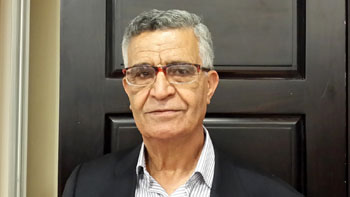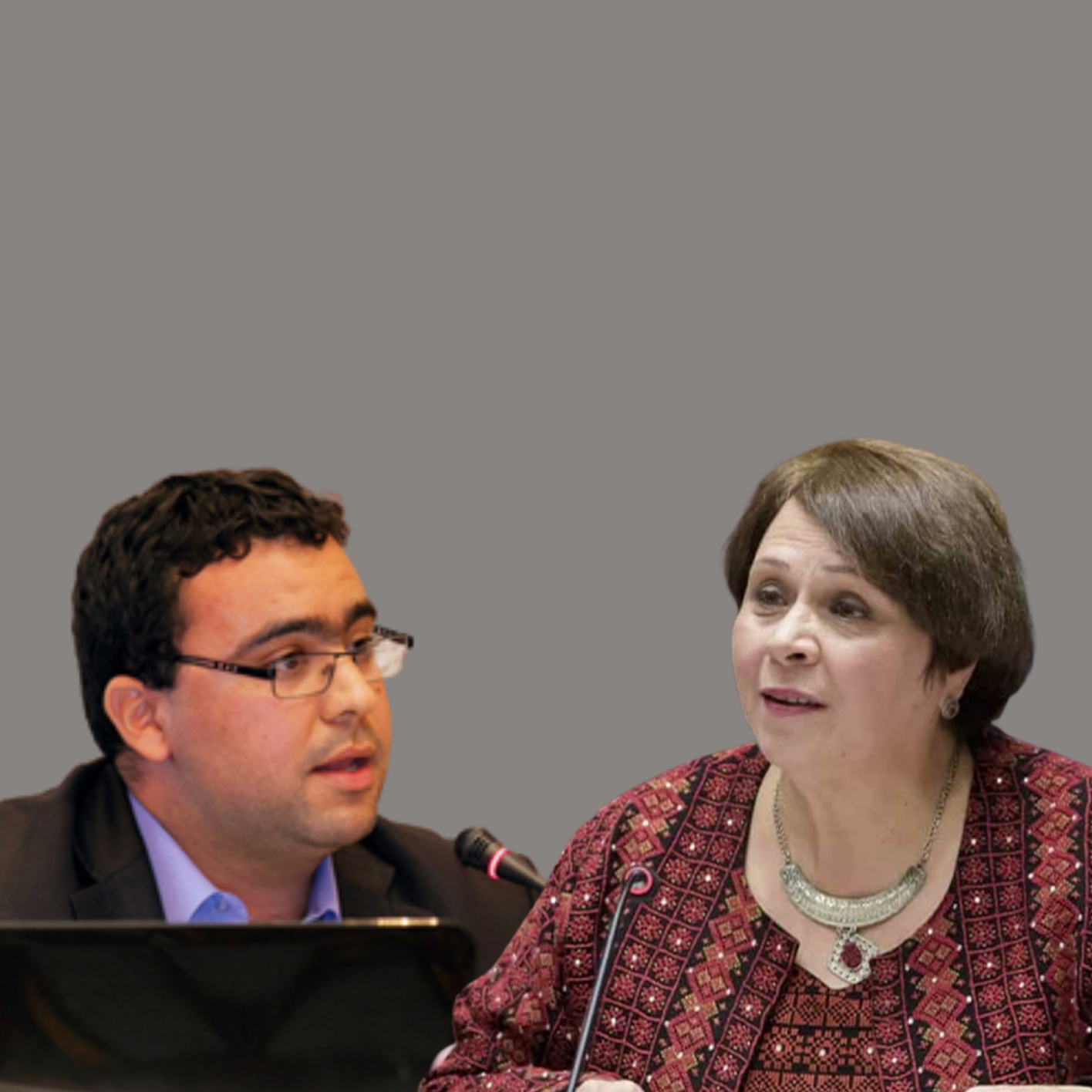
Introduction:
The developments that followed the Palestinian leadership’s decision to restore relations with Israel and after the Democratic Party candidate Joe Biden winning the US elections, have created a new reality on the Palestinian scene. This involves the impact of these developments on internal Palestinian conditions, the future of the peace process with Israel and the projected repercussions of the US election results on the Palestinian cause. At the same time, the Arabs are normalizing more and more with Israel without first resolving the Palestinian-Israeli conflict as a precondition for this normalization.
Following is the full text of “Hosted by MIFTAH’s” interview with Dr. Shuaibi
Restoration of relations with Israel
Dr. Shuaibi believes the leadership’s decision to restore relations with Israel is linked to President Mahmoud Abbas’ desire to continue the political negotiating process with the Israelis in coordination with and support from Arab countries accepted by both Israel and the United States, especially Egypt and Jordan.
President Abbas’ official position, which was announced by Fatah Central Committee member Hussein Al Sheikh, reflects a number of decisions associated with the president’s desire to be part of the Arab framework and alliance led by Egypt, Saudi Arabia, Jordan and Morocco.
President Abbas’ decision to join this framework was made without any declared justification whether by the PLO or in his address to the people. No doubt, his decision was influenced by the US election results and the lack of any financial solutions in respond to the declining economic situation in Palestine, coupled with an increasingly disgruntled people. The economic and commercial sector in particular were hit the hardest in addition to certain areas such as Hebron, not to mention the PA’s inability to impose its authority in the Gaza Strip.
In the past three years, the President has been seeking out Arab and international support, especially after the restoration of relations with Israel, in order to convene an international conference with the Quartet Committee, Egypt and Jordan. This would serve as an alternative to the sole role of the US as broker and based on international resolutions as its terms of reference.
President Abbas was apparently reassured by Egypt, Jordan and Saudi Arabia that they would help to convene an international peace conference with the support and consensus of France, Germany and the EU. This, he believed, would help ease into a return to direct negotiations with the Israelis in cooperation with the new US administration, regardless of the political makeup of the next Israeli government and ultimately reach a settlement he could accept.
For the President, a return to negotiations, with a guarantee that Hamas does not oppose them, would be considered both an objective and an achievement at this stage. Israel is continuing with its land-grab policy in the hopes that at some point in the future, the time will be right for the realization of the Zionist dream of a full takeover of Palestine, granting the Palestinians limited autonomy. Consequently, Israel is not interested in eradicating the PA but at the same time, it continues to resist any efforts to end the division and restore official relations between PA institutions in the West Bank and Gaza.
Reconciliation and putting the Palestinian house back in order
What is the future of Palestinian reconciliation and putting our own house in order, in light of the return to relations with Israel?
Dr. Shuaibi says: I don’t think President Mahmoud Abbas believes the most recent intra-Palestinian talks will necessarily lead to an agreement over a new national program that Palestinians will unite around and execute. He says Abbas wants to return to direct negotiations with the Israelis from the point where they were halted. He still thinks the PLO program approved by the PNC in 1988, is the appropriate program for the Palestinians. This program is based on UNSCR 242, renouncing violence and adopting direct negotiations with the Israelis in addition to the declaration of independence for Palestine on the 1967 borders on which the Central Committee approved the Declaration of Principles in Oslo. This is why the President has always specified his position regarding the future of national dialogues in relation to the need to integrate political Islamist movements into the PLO on condition that they accept this program at the practical level. That is to say, they already accepted the premise of the PLO being the sole and legitimate representative of the Palestinian people and of the establishment of a Palestinian state on the 1967 borders.
For example, several years ago, President Abbas supported internal talks when the peace process came to a standstill. Consequently, talks to end the division were halted when there was a sense that the leadership would return to negotiations. This does not mean Hamas was always in favor of ending the division. It first looked to secure its own interests at the expense of the overall national interests in addition to its affiliation with the Muslim Brotherhood at the regional level.
Pressure from Arab parties led to President Abbas postponing the issue of internal dialogue and reconciliation with Hamas in order to make it easier to return to negotiations. This was when he acted in isolation of these countries and visited Turkey, Iraq and the Security Council.
Shuaibi believes national unity will never be accomplished if we bank on the same approach of “waiting it out”, all while Israel continues with its policy of taking over the largest possible area of land in the West Bank, besieging Palestinian communities. Hence, he believes the return of the Democratic Party under the new US administration is an opportunity to restructure the internal situation and the President’s Arab relationships.
The President still thinks he can continue with his old strategy in partnership with Arab countries and implement regional arrangements. From his point of view, this could lead to changes in the American position, which in turn would open up opportunities for a return to the “settlement process”. He also thinks the new US administration, like the old one, will try and build an alliance in the region comprised of Sunni Arab countries and Israel to guarantee stability in spite of Israel and some Arab Gulf countries’ goal of confronting the Iranian Shiite alliance, “from which the Palestinians and their cause have nothing to benefit.”
General elections
In regards to elections, the President realizes he cannot hold general elections in the West Bank and Gaza Strip without Hamas agreeing to them in Gaza. He knows Hamas has complete control over Gaza and therefore, any decisions such as holding general elections, will require its consent. In this regard, these elections cannot be held in the shadow of the division, which means they must be held within the framework of reconciliation arrangements.
Dr. Shuaibi maintains, “The President wants to coerce Hamas into joining him on the same path towards negotiations. He thinks Hamas will negatively impact his efforts if it remains outside of the PLO. This might be the best possible time for him to hold elections to secure and contain Hamas’ opposition and also to strengthen his own representation.”
The future of the PLO and its institutions
“President Abbas is banking on the continuation of the status quo; that is, no change to the legitimacy Fatah granted him as its president or to the support he gained in the last PNC elections in 2018, which further reinforced his legitimacy. From his perspective, the President believes he has legitimacy to continue leading the PLO in his capacity as the elected head of the largest Palestinian faction. This is further reinforced by recognition of this status at the Arab and international level. Shuaibi also maintains that Abbas believes the recent makeup of the Central Council will secure the legitimacy and support of his position at a later stage, which means PLO institutions will remain weak and even paralyzed.
The fate of the PA
Dr. Shuaibi maintains that the dissolution of the Authority is not likely, nor is it in the interest of any party, including Israel and Hamas. “The current alliances, which are partly backed by international parties such as the United States and even European countries, in addition to the presence of countries such as Turkey, Iran and Israel, are not keen on the departure of the PA. Neither do the Palestinians have any other option but to continue with the current status quo. The same goes for the Israelis, who would not benefit from the collapse of the PA; neither would Hamas, especially after its experience in administrating the Gaza Strip and ultimately failing to establish an alternative authority to the PA in Gaza. That is why the PA, in its current shape and program, is a comfortable option for parties and does not contradict with the PLO’s program in that its strategy is based on the ongoing transformation from the PA to a state and on pressuring countries to recognize Palestine in accordance with the Palestinian national program declared in 1988.
The Arab condition and normalization
Dr. Shuaibi addresses the recent Arab condition and how some Arab regimes are racing towards normalization, saying this is a ‘reordering” of the Middle East after the elimination of the roots of terror, Al Qaeda and ISIS mainly. It also comes after Trump’s plan, which was based on the idea of building an alliance in the region to confront anti-US and western forces, namely in Iran, Turkey and Russia, in addition to pushing back against the Chinese “Silk Road” program that passes through this region. This was why there was a desire to establish a regional alliance in the area, based on Arab Sunni-Muslim countries and Israel as a security and economic power on the ground. This kind of alliance requires a solution and elimination of the Palestinian cause within a framework solution and via Trump’s plan and would pave the way to build normal relations between Sunni-Arab countries and Israel. However, when the Palestinians derailed this solution by not participating and actively confronting it, some Arab countries showed their willingness to build on this alliance, even without a solution to the Palestinians and without a Palestinian presence. After the US elections, both Egypt and Jordan seemingly found an opportunity to rebuild a regional alliance with a Palestinian presence. They also found a way to rebuild the relationship with Israel via an Arab entry-point and not through the bilateral normalization of these two countries. That is, Jordan, Egypt and Saudi Arabia are prepared to pressure the new US administration into accepting the convention of an international conference where these countries are willing to participate along with the Quartet Committee. That would make the Arabs a party in the negotiations and in pressuring the Israelis as an alternative to the current Arab project, which is based on the Arab Peace Initiative that calls for normalizing with Israel after the resolution of the Palestinian cause.
The US election results and repercussions
Dr. Shuaibi maintains there are domestic, regional and international repercussions to the US election results. He says the US administration will first focus on its domestic issues as a priority. “No doubt, the Trump plan is over, which is a good thing for the Palestinians, because this plan was being commandeered by the Zionist movement’s far right, which believes it can forcefully impose a settlement on the Palestinians. Such a settlement would give Zionism legitimacy over the majority of the Palestinian territories and relegate the Palestinians to fragmented minorities living in cantons. Such Palestinian entities would have no value unless they were linked to this or that Arab country or if they formed some weak quasi-state in the Gaza Strip, thereby dividing loyalties in the West Bank.
Today, Trump’s plan may have been halted, but this does not mean Israel has changed is plans on the ground. This is because the foundation of the Zionist project is not based on American consent but on its support, while being a direct Israeli project in and of itself. This is why Biden will focus his priorities on US interests and the domestic situation. The Covid-19 pandemic has also been a clear point of contention, given how his predecessor, Donald Trump, handled the crisis and failed to adequately address it. It was also one of the reasons that helped Biden beat Trump in the elections, which means combatting the epidemic will be one of his priorities. We already know that at least the first year of his new administration will largely focus on this issue.
The other issue he will focus on is the economic situation in the United States, because this is the ticket on which Trump was elected. That is why the new administration must offer some economic solutions to the domestic situation and to unemployment rates in particular, which spiked during the pandemic. He will then turn to improving American-European relations, which were rattled during the Trump era and which Biden and his Vice President described as a return to the world, a return to the UN and to international agencies. This means a reemergence of the US in these venues, but it also means there will be no real efforts or priority by the administration to resolve the Palestinian-Israeli conflict. However, we know that AIPAC and the Zionist movement voted for the Democrats, which means they could have an influence on improving Israeli-American relations, which were damaged because of the Netanyahu government’s bias towards Trump. This will require security and financial support to Israel in exchange for appeasing the Arabs by taking some measures that would effectively cancel out Trump’s previous decisions such as closing the PLO office in Washington, restoring financial support to UNRWA and resuming financial aid to the Palestinian security services and to charitable associations in Palestine, followed by a reopening of the US Consulate in occupied East Jerusalem.
Nonetheless, Europe – France and Germany in particular – could be given a role in facilitating the convention of an international peace conference similar to the Madrid Conference. This would allow the Arab leadership, represented by Jordan, Egypt, Saudi Arabia and Morocco, to be main partners in the conference alongside the Quartet Committee, comprised of the US, the EU, UN and Russia. After the conference, there would be a return to direct long-term negotiations between the Palestinians and Israelis.








